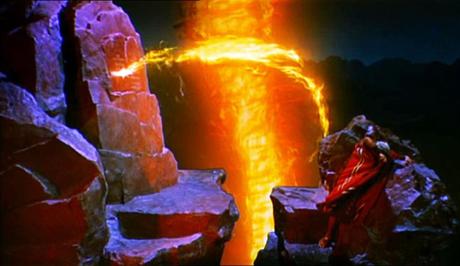 The giving of the Ten Commandments, with Charlton Heston as Moses
The giving of the Ten Commandments, with Charlton Heston as Moses
Today is Good Friday, a day commemorated across the globe as one of tragedy and misfortune that, leading to eventual triumph and hope, culminates Sunday on a glorious Easter morning. Earlier in the week, Jews from around the world observed the solemnity of Passover, a time when Death passed over their households.
Knowledgeable readers, too, may recall the 2003 protests for and against a controversial ruling involving the imposition of a Ten Commandments monument at the state judicial building in Montgomery, Alabama - a veritable clash between the sacred and the secular.
Concurrent with that story, the 2003 commemoration of the 40 th anniversary of the March on Washington brought to mind how much people of faith have taken this unique and inspiring symbol of God's ancient law for granted.
Flash forward to 2020 and the coronavirus pandemic, a scurrilous plague of Biblical proportions if ever there was one. Oh, how humanity needs its "manna from heaven" moment!
To echo a well-worn phrase, "familiarity breeds contempt." You may be under the assumption that everyone has advance knowledge of what Passover, the Exodus, and the Ten Commandments came to symbolize, what ostensibly led to their evolution, and what they entail for us TODAY as far as a spiritual guidepost for these fearful, stress-filled times.
Politics aside, most God-fearing citizens have forgotten the sacrifices that went into the shaping of this gift of His promise for a happier earthly existence. We tend to overlook how God's chosen people, the Hebrew slaves of Egypt, long sought to put an end to their suffering under the yolk of pharaonic vanity and abuse; how they yearned for freedom, and waited in vain for deliverance to the Promised Land, as prophesied in those same Old Testament passages.
Over the years, we've allowed ourselves to overlook the obvious modern parallels to African-American struggles for dignity, respect, and racial equality in other, more socially intolerant times. The same holds true for our growing Latino population, for the millions of poor and homeless people, and for those less fortunate than ourselves.
If only we could make real what was conveyed so wondrously in the pages of Holy Scripture. Similarly, if only we could empathize with the historical, social, and religious contexts that helped shape the thoughts, lives, and social patterns of these same individuals, who so valiantly fought - and died - for their beliefs, so that we, today, might enjoy the blessings of freedom under a merciful, loving, and protective godhead.
For home-bound viewers, there exists a number of cinematic recreations of the Old Testament story of Moses and the Hebrew Exodus from Egypt, preserved as a makeshift "visual record" of these events. In lieu of physical Sunday-school lessons (due to social distancing constraints), these films have been made available to one and all via Blu-ray, DVD, YouTube, and/or various streaming devices.
All serve to inspire and enlighten us. But most importantly of all, they can be viewed, singly or as a whole, as filmed reminders of Moses' symbolic significance to all faiths as the harbinger of Christ's mission on Earth; and as a powerful lesson to world leaders to humble themselves before nature and the environment.
THE TEN COMMANDMENTS (1923): 146 minutes
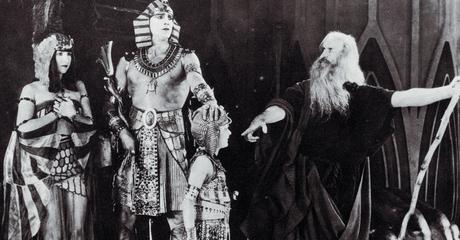
One of the earliest motion picture representations of the story of Moses and the Exodus that remains widely accessible to movie audiences comes from famed producer-director Cecil B. DeMille.
A former stage actor and Hollywood co-founder, DeMille, even in the silent-film era, was known for his lavish historical pageants and superb handling of mass movement in crowd scenes.
His first crack at the Biblical genre came with the 1923 silent version of The Ten Commandments, starring veteran stage and film actor Theodore Roberts as Moses, Estelle Taylor as Miriam, Charles De Roche as Pharaoh, Julia Faye as Nefertari ( sic), and James Neill as Aaron. Released by Famous Players-Lasky Corporation and distributed by Paramount Studios, the production was partially filmed in the desert country of Guadalupe, Mexico.
The sets and costumes are impressive, as is the flamboyant acting by the principals. The mighty Exodus sequence and the handing down of the Commandments are dealt with in expert fashion, while the plagues are given short shrift (only the last and deadliest plague is depicted). Still, the rudimentary effects, particularly the pillar of fire and the parting of the Red Sea, are indeed remarkable for the time.
The second (and longer) portion of the film is devoted to a more "contemporary" interpretation of what happens to one of two siblings who continuously breaks God's laws. Richard Dix and Rod La Rocque play the battling brothers (one good, one bad) in traditional clutch-and-stagger style. Silent movie queen Nita Naldi vamps it up as the tragic temptress who comes between them.
In the prologue, the haughty Pharaoh Rameses (De Roche) is brought to his knees upon the demise of his firstborn son (Terrence Moore). Alert viewers will notice some startling similarities between the way DeMille captured this and other sequences when juxtaposed with his 1956 remake (see below).
Having doubled Paramount Studios' initial outlay from US $600,000 to over $1.2 million (and giving nervous backers a mild coronary in the process), DeMille's gambit paid off handsomely at the box office.
Despite the soap-opera trappings - there are more than enough melodramatic subplots, including a preposterous episode about a lover infected with leprosy - the movie proved a hit with the Roaring Twenties crowd, raking in an incredible four million dollars in its day.
The first part, running about 50 minutes in length, is the more gripping section, and is recommended for joint family viewing. You will want to fast-forward through the stagy second sequence, however, which tends to drag a bit and may prove too mature for young children to fully grasp.
THE TEN COMMANDMENTS (1956): 245 minutes (with overture, intermission and exit music)
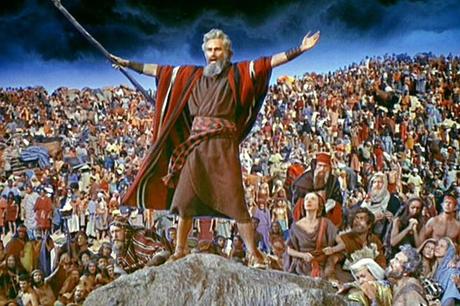
DeMille's next attempt at the story was the widescreen Technicolor extravaganza The Ten Commandments, released by Paramount in 1956. It is quite possibly the most well-known and widely viewed religious film ever made. DeMille made the wise decision to drop the modern parallel and stick to the tried and true, especially after the runaway success of the earlier Samson and Delilah from 1949.
The wily director-producer spared no expense in the crafting of his greatest work, which stars the then-relatively unknown Charlton Heston as Moses, Yul Brynner (fresh from his Broadway triumph in The King and I) as Rameses II, Anne Baxter as his voluptuous wife Nefretiri, Edward G. Robinson as the overseer Dathan, Yvonne De Carlo as Sephora, John Derek as Joshua, Debra Paget as Lilia, John Carradine as Aaron, and a literal cast of thousands.
DeMille went on location to Egypt and the Sinai Peninsula for the Exodus and other desert sequences. Returning to the U.S., the production team resumed shooting on eighteen Hollywood sound stages, with another twelve waiting for them in Paris, France.
While this version is considered pure camp - with such ludicrous plot devices as the bogus romance between Moses and the future Queen of Egypt, and an absurd love triangle between Baka the Master Builder (Vincent Price), Lilia the water carrier, and Joshua the stonecutter - the gargantuan sets, fabulous costumes, gorgeous production values, and memorable music score by novice composer Elmer Bernstein, are all worthy of attention.
As Ole Man Mose himself, Heston steadfastly maintained that his casting as the fiery prophet made him a household name in the movie industry. It was his first successful foray in a long line of religious and historical figures to be interpreted by him on the big screen. His looks and voice, and moving portrayal (plus the apparent sincerity Heston gave to the part) lift this film out of the usual dull run of Biblical epics.
Several of the scenes, including the Burning Bush sequence, the plagues of Egypt, the Exodus, the parting of the Red Sea, and the giving of the Commandments have gone down in movie history as among the most memorable ever filmed (see the following link for a fuller in-depth analysis of DeMille's biblical epic: https://josmarlopes.wordpress.com/2012/07/16/the-ten-commandments-american-society-in-the-fifties/).
The last of those nasty plagues, the one that brings the Destroyer into the heart of Pharaoh's household, will send shivers down your spine (it was quite effective in the movie theater, of that I can personally vouch for). It's one of the few sequences in the three hour and thirty-nine minute epic that is not over the top.
Highly recommended for all family members, the movie is best appreciated in its letterbox format.
MOSES - THE LAWGIVER (1975): 150 minutes; mini-series 360 minutes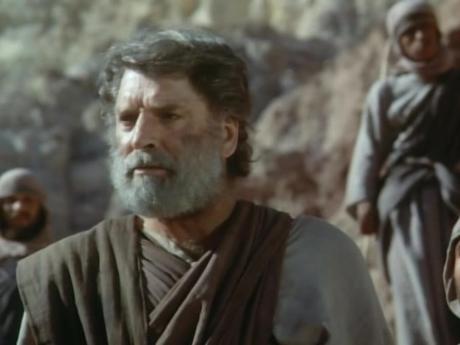
A British-Italian-Israeli co-production based on the book of Exodus, the title, Moses - The Lawgiver, did not bear the marks of a primetime ratings grabber, not by any means. Nevertheless, this 1975 foreign-made version was first broadcast on the small screen as a six-hour television mini-series.
It features American actor Burt Lancaster as Moses, his son William Lancaster as the young Moses, veteran English character player Anthony Quayle as Aaron, Ingrid Thulin as their sister Miriam, Marina Berti as Elisheba, and Greek film star Irene Pappas as Moses' wife. Curiously, it was partially filmed in Rome, Morocco, and the Holy Land during the height of the Yom Kippur war. The script is by Anthony Burgess, author of the futuristic novel A Clockwork Orange.
The story is presented in fairly reverent, straight-forward fashion, the dialogue highly literate, and a low-key Lancaster surprisingly good in the title role. Just don't expect the usual Hollywood-style histrionics to spice up the proceedings, though, as this version is more dialogue-heavy than most.
Too, it takes a more intellectual approach to the saga. As for the special effects, they are modest in comparison - I'd say pedestrian, to be frank, and not even close to big budget standards.
The mini-series was subsequently released to theaters as a feature-length film, but the extremely mundane atmosphere, dusty sets, and colorless wardrobe did not provide much in the way of competition for the two earlier DeMille flicks. On a side note, many of the crew members, including producer Sir Lew Grade, worked on the subsequent Jesus of Nazareth mini-series from 1977, directed by the late Franco Zeffirelli, a much more ambitious and noteworthy assignment.
Recommended for older audiences but with the above reservations. Younger viewers might find it too talky and the performances lackluster.
THE PRINCE OF EGYPT (1998): 97 minutes
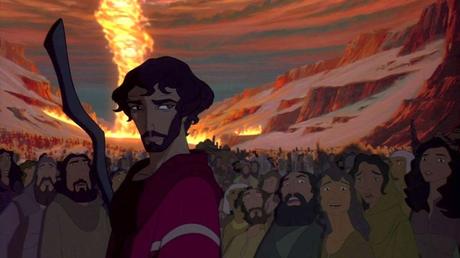
For a change of pace, kids of all ages may want to tune in, along with their parents and friends, to this animated musical account of the Exodus story. The Prince of Egypt, a 1998 production by DreamWorks Pictures, was a joint Steven Spielberg-Jeffrey Katzenberg studio venture.
It incorporates state-of-the-art digital animation effects, and utilizes the services of Val Kilmer as Moses, Ralph Fiennes as Pharaoh, Patrick Stewart as his father Sethi, Michelle Pfeiffer as Tzipporah, Jeff Goldblum as Aaron, Sandra Bullock as Miriam, Danny Glover as Jethro, and Ofra Haza as Yochaved, with Steve Martin, Martin Short, and Broadway's Brian Stokes Mitchell, in other key roles, to tell the tale of Moses, the parting of the Red Sea, and the giving of God's Laws.
Despite the clash of accents among the talented international cast, the story is clearly and succinctly told. The voice acting, especially by Kilmer and Fiennes as equally-matched combatants, is extraordinarily well done. Much care was taken with the script so as not to offend anyone's sensibilities. If anything, this treatment is almost too mild by comparison to DeMille's gaudier excesses.
Nevertheless, this visually-stunning animated version, which is vastly superior to most Saturday morning children's fare (if not quite up to the advanced level of the best of the Disney/Pixar Studios' efforts), is entertaining and worthwhile.
The visual rendering of the characters favors an elongated look reminiscent of the Mannerist school of portraiture (think El Greco, or possibly Modigliani) that gives the finished product a uniquely original stamp of its own.
Interestingly, the rivalry between the young prince Moses and the future pharaoh Rameses is a thinly-veiled reworking of the Judah/Messala conflict found in M-G-M's 1959 widescreen version of Ben-Hur, another superior religious picture. Thankfully, the script for this outing, written by veteran screenwriter Philip LaZebnick ( Pocahontas, Mulan, The Road to El Dorado), is on the same high level as that William Wyler-directed opus.
And there's even a hit song, i.e., "When You Believe," to thrill to (written by composer-lyricist Stephen Schwartz), beautifully sung in the movie by Ms. Pfeiffer and repeated, in the end credits, as a power duet between then-reigning pop divas Mariah Carey and Whitney Houston. The score itself is by Hans Zimmer.
This is highly recommended for all family members.
EXODUS: GODS AND KINGS (2014): 150 minutes
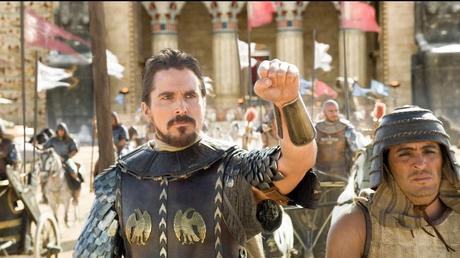
Finally, there's director-producer Ridley Scott's Exodus: Gods and Kings from 2014, with Christian Bale as Moses, Joel Edgerton as Pharaoh, John Turturro as Sethi, and Aaron Paul as Joshua, with Sigourney Weaver, Ben Kingsley, and Ben Mendelsohn.
This version has not yet been viewed by yours truly. But with a cast such as this, it would be unfair of me to pass judgment on its merits. About the best I could say for it, though, is: Buyer beware!
Still, this and the above entries serve to perpetuate the Idea that haughtiness and vanity will only get you so far. The high and mighty will be brought down and laid low before forces too powerful to be controlled.
Copyright © 2020 by Josmar L. Lopes
